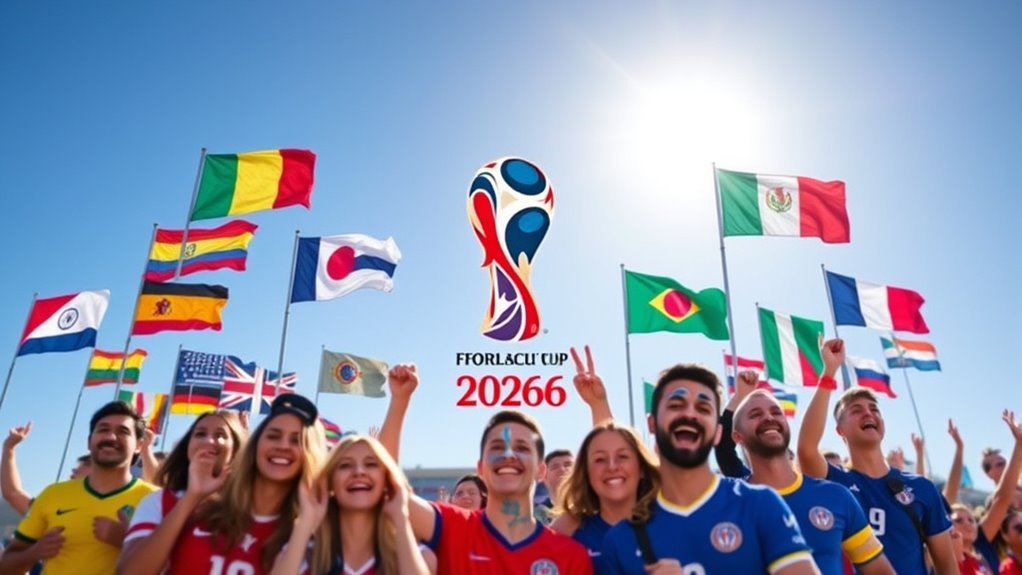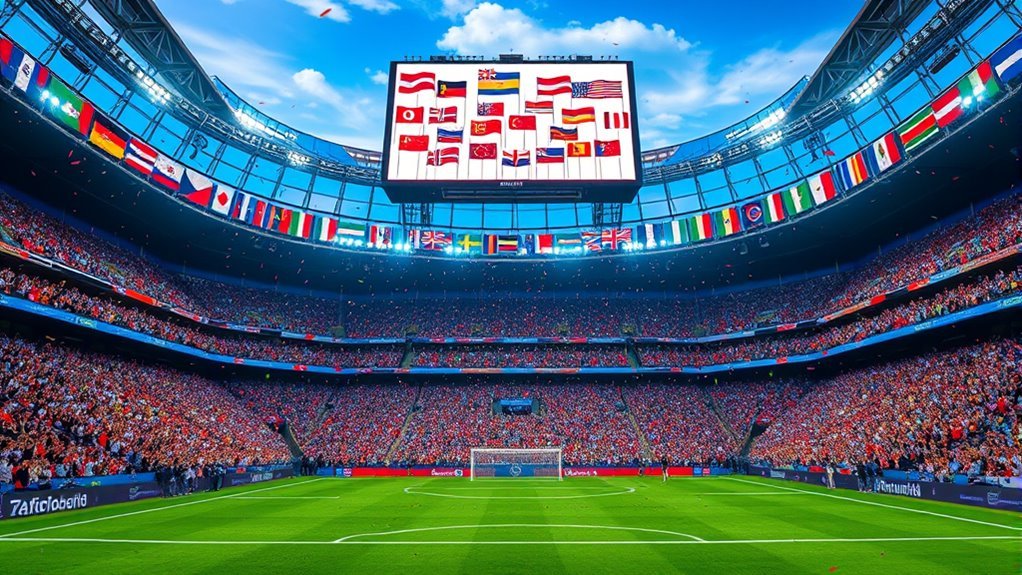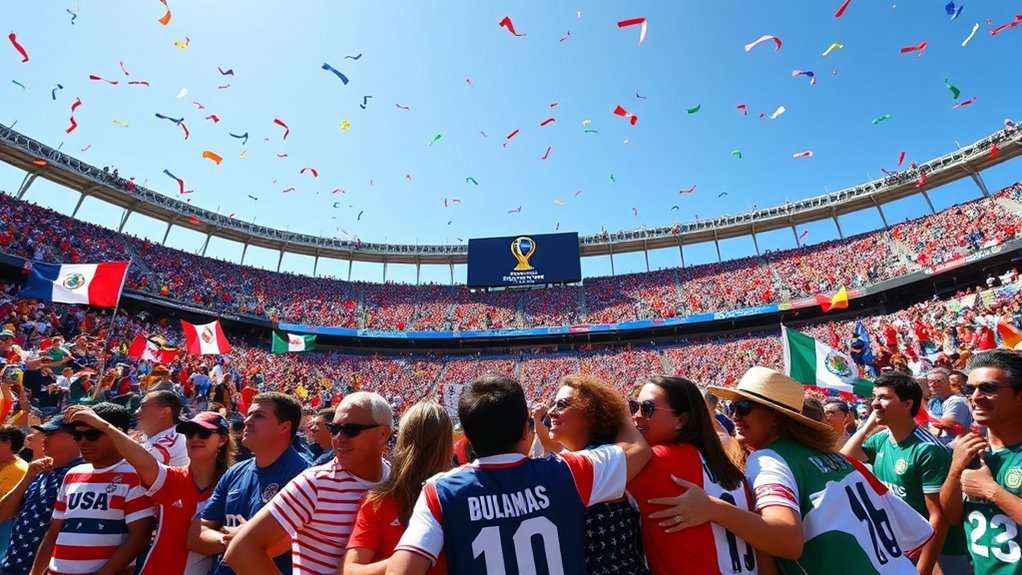As of now, four countries have qualified for the FIFA World Cup 2026. These include the host nations, USA, Canada, and Mexico, alongside Italy, the defending European champions. With this expanded tournament format, more teams will compete, enhancing global representation. You might be curious about the qualification pathways and what’s in store for the remaining spots. There’s plenty more to learn about how this tournament is shaping up!
Overview of the Qualification Process
As you immerse yourself in the qualification process for the FIFA World Cup 2026, you’ll find it’s a bit different from previous tournaments. The expanded format means more teams will have the chance to showcase their talents on a global stage. This year, the qualification criteria have been designed to enhance global representation, ensuring that more regions have a voice in the competition.
You’ll notice that each confederation has its own specific pathways, reflecting the unique soccer landscapes across the world. From CONCACAF to AFC, these pathways aim to celebrate diversity and skill. The emphasis is not just on the traditional powerhouses but also on emerging nations aiming for recognition and freedom on the pitch.
Current Qualified Teams
While the qualification process is still ongoing, several teams have already secured their spots for the FIFA World Cup 2026. These nations have shown impressive team performances, reflecting their strength in the current standings. Here’s a quick look at the current qualified teams:
- USA – The host nation, known for its rising talent and strong soccer culture.
- Canada – Making a mark with a blend of youth and experience.
- Mexico – A consistent powerhouse in the region, always a contender.
- Italy – The defending European champions, showcasing skill and tenacity.
As the excitement builds, it’s clear these teams will bring their unique flair to the tournament. Keep an eye on their journey, as the remaining spots will surely be fiercely contested. The freedom of competition keeps the spirit alive, and you won’t want to miss any of it!
Regional Qualification Allocations
With several teams already confirmed for the FIFA World Cup 2026, attention now shifts to how the remaining spots will be filled through regional qualification allocations. Each region has been granted specific qualification slots to guarantee a fair representation of global talent and regional diversity. For instance, CONCACAF, which includes North and Central America, will have a significant number of slots, reflecting the host nations’ influence. Meanwhile, regions like Africa and Asia will also see expanded opportunities, allowing more teams the chance to showcase their skills on the world stage.
These allocations not only promote competition but also celebrate the unique styles and cultures of participating nations. As you follow the qualification process, you’ll witness the unfolding drama as teams compete for their shot at glory. The excitement is palpable, and every match counts as teams aim for their place in this monumental event.
Impact of the Expanded Format
The expanded format for the FIFA World Cup 2026 is set to transform the tournament landscape, allowing more teams than ever to compete on the world stage. This change will enhance global representation and create exciting opportunities for fans and players alike. Here’s how:
- Increased Participation: With 48 teams, more nations can showcase their talent and passion.
- Diverse Competition: The expanded format allows for a greater variety of playing styles and strategies.
- New Markets: Countries can experience the thrill of hosting matches, promoting soccer’s growth in untapped regions.
- Fan Engagement: More teams mean more stories, rivalries, and celebrations, bringing fans together across borders.
This shift not only celebrates the spirit of competition but also fosters a sense of unity among nations. You can look forward to a vibrant tapestry of cultures and styles, making the 2026 World Cup truly unforgettable!
Future Implications for International Soccer
As the 2026 World Cup ushers in an era of increased participation, its implications for international soccer are profound. With more nations involved, you’ll see an exciting boost in global soccer growth. This expanded format encourages countries to invest in youth development initiatives, fostering talent from a young age. It’s about creating pathways for aspiring players worldwide, empowering them to chase their dreams.
Here’s a glimpse of potential impacts:
| Implication | Description | Example |
|---|---|---|
| Increased Competition | More teams will elevate the game. | Upsets and thrilling matches. |
| Global Talent Exposure | Diverse players gain visibility. | Scouts finding hidden gems. |
| Enhanced Investment | Countries will invest in facilities. | New training centers emerging. |
| Cultural Exchange | Different styles enrich the game. | Unique playing philosophies. |
| Youth Engagement | More kids inspired to play. | Grassroots programs flourishing. |
The future’s bright, and it’s your chance to engage.
Frequently Asked Questions
When Will the FIFA World Cup 2026 Take Place?
The FIFA World Cup 2026’s set for June 8 to July 8. In FIFA history, it’ll be unique, featuring three host countries. You’ll witness thrilling matches and unforgettable moments celebrating global soccer’s spirit and freedom.
Where Will the Matches Be Held?
The matches will be held in a tapestry of host cities across North America, where venue selection weaves together vibrant cultures and passionate fans, creating a symphony of excitement that’ll resonate throughout the tournament.
How Can Fans Purchase Tickets for the Tournament?
To purchase tickets for the tournament, you’ll want to keep an eye on official ticket sales announcements. Engaging in fan experiences can also enhance your journey, ensuring you enjoy every moment of the event.
What Changes Are Being Made to the Tournament Format?
Imagine a vibrant stage, with 48 teams competing instead of 32. This tournament expansion allows more nations to shine, while the qualification criteria evolve, inviting fresh talent and diverse stories to the beautiful game’s grandest stage.
Which Teams Have Historically Performed Well in World Cups?
You’ll find that Brazil, Germany, and Italy are World Cup legends, consistently showcasing historical performances. These teams have captivated fans with their skill, passion, and resilience, embodying the spirit of freedom in football.




